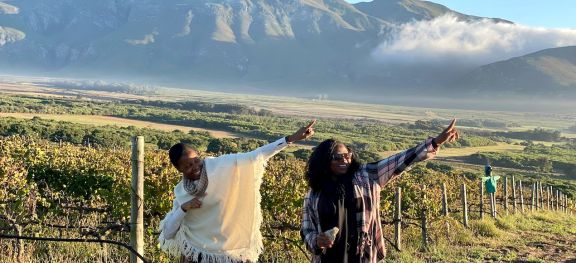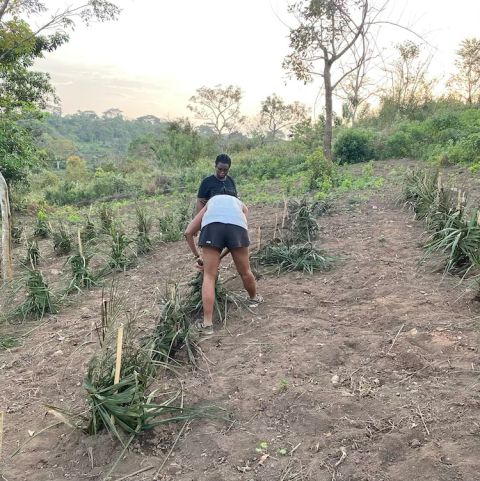South African catch-up

We revisit the South African wine people of colour profiled in 2020 and assess the rate of transformation there.
Two years ago we published a series of profiles of up-and-coming wine people of colour in South Africa. I thought it would be interesting to see how they were getting on, with of course the massive brake on progress provided by the COVID-19 epidemic, which hit the Cape wine industry particularly hard.
The person who has made arguably the most dramatic change to their work life is Jeanne Vito (pictured above (left) with Akouvi Rolande Kpokou at Springfontein Wine Estate). Last year she took over responsibility for cellar and vineyard at her partner’s winery Springfontein and has not only produced her first Chardonnay and Pinot Noir under the Cape Moby brand, as well as the winery’s first bottled Chenel, a robust Chenin Blanc x Trebbiano cross, but has planted a brand-new vineyard in virgin country in her father’s native Togo. She wanted to honour her father, a vigneron in Burgundy, but also to provide a local alternative to all the wine Togo is now importing in bulk from Europe for re-export.
The site, currently without road access, is at over 700 m (2,300 ft) elevation in Togo’s ‘green lung’, where most of its coffee is grown. Average annual rainfall is a worrying 1,700 mm (67 in), though in the dry season a nearby mountain well is much treasured. A 1.5-ha (3.7-acre) experimental plot was planted in 2020 with Chardonnay and Pinotage and the seedlings painstakingly covered with palm leaves to protect them from sunburn. So far so good but it is still too early to assess long-term prospects for viticulture in Togo.
Rüdger Van Wyk, who makes the wine at Stark-Condé as well as his own label Kara-Tara, is going from strength to strength, winning acclaim in the Decanter World Wine Awards and Wine Spectator in the US. But he didn’t mention this when I asked him for an update. The first thing he wanted to report was that, as of the 2022 vintage, all his wines will be certified organic. He also wrote:
‘Since the last article in 2020, or COVID-19, I’ve had a lot of time to reflect, inspect and aspire to what and where I see myself in the industry and what personality our wines should have. A lot has been said over the last two years and I’ve seen positive engagement from all the industry role players in our country to try and help and change for the better.
‘I’m very proud and excited to see a new wave of Black winemakers who are either already making amazing-quality wine or waiting on the frontline to get their opportunity: winemakers like myself who were mentored and upskilled to craft top-quality wines like Kiara Scott (Brookdale [see below]), Banele Vakele (SAVAGE wines, Tembela Wines owner), Wade Sander (owner Brunia Wines), Natasha Williams (owner Lelie van Saron), Morgan Steyn (assistant winemaker at De Grendel) etc. I’m very excited to see where we, as the SA wine industry, will be in the next five to 10 years, because I believe that we are only getting started.’
He’s particularly proud of the maiden release of Stark-Condé’s Monk Stone Chenin Blanc.
‘There’s not much Chenin Blanc planted in Jonkershoek Valley; the grape is normally associated with warmer regions. But couple of years ago, we had an idea to plant Chenin on the higher, cooler slopes on our farm. We believed this spectacular site was suited to producing an intense, mineral style of wine. With granite soils and a crazy steep incline, we carefully terraced the hillside to avoid mudslides and managed to plant what I believe is a unique site for Chenin. Every winemaker or viticulturist that visits the site drools with envy!
‘My personal taste in white wine leans toward the intense, mineral style. I like the fine tension between the lightness of mouthfeel and the depth of fruit. The Monk Stone Chenin Blanc is matured in a combination of handmade clay amphorae (fired from local clay) and neutral French oak barrels. I believe this to be an ageworthy Chenin.’
As for his Kara-Tara Pinot and Chardonnay, they are already exported (Museum Wines import them into the UK, where he will be in September) and this year he released a Reserve Pinot 2020 from an isolated vineyard in Overberg. His wines are definitely worth looking out for.
I was meant to meet up with Ntsiki Biyela, who makes Aslina wines, in London in June but her samples got held up en route north. (Sound familiar?) She wrote:
‘Since we were last in touch, Aslina has been able to weather the COVID-19 storm successfully and, thanks to our growing base of export clients, has seen consistent growth despite repeated restrictions on local sales of alcohol in South Africa.
‘We now have a well-established relationship with an importer in the UK (whose name you kindly passed on when we were exploring UK options), MJ Cellars. Mags Janjo is a great partner for us and has established a presence for Aslina and grown our footprint in the UK. Thanks to the return of unrestricted travel, I will be visiting the UK in August (visa processing willing) and then onto the United States to meet with clients across the country.
‘In addition to the UK and US, we are exporting to a number of countries in Europe, including Germany, Netherlands, Switzerland, Sweden and Norway, as well as Japan and Canada. And we are increasing our presence in Africa, having added Botswana, Ghana and Swaziland to our client list.
‘We continue to produce Umsasane (our bordeaux blend), as well as our Cabernet Sauvignon, Chardonnay and Sauvignon Blanc. In addition, we have introduced a skin-contact Chenin Blanc to our family of wines and our first vintage, 2021, has just received a Gold medal in this year’s Sakura Japan Women’s Awards. Our 2022 vintage is currently in production and will be released hopefully in October/November this year.
‘We have also introduced an MCC [Méthode Cap Classique], in honour of my mom, nicknamed Ms MC as she is affectionately called by my cousins. This has been produced in limited quantities and is currently only available in the local market.
‘Aslina Wines is proud to have received several awards – among them a Trophy for Umsasane 2019, Gold for Cabernet Sauvignon 2019 and Double Gold for Chardonnay 2020 all at the 2021 Michelangelo wine awards, and recently Silver from Decanter for our Chardonnay and Umsasane 2020, to name but a few.
‘I personally was awarded the Diversity and Transformation Award in February 2021 at the Wine Harvest Commemorative Event for pioneering work in the SA industry. This was a great honour in recognition of my role in paving the way for others by eliminating barriers; setting an example and inspiring others; contributing to knowledge that others can use; and having an overall influence on the image of the South African wine industry.
‘We are looking forward to continued success!’
Ntsiki is on the board of the Pinotage Youth Development Academy, which will be celebrating its 10th anniversary this September. One of the many young people who have passed through its doors is now working with Ntsiki at Aslina.
You may remember the very personable, young Kiara Scott, who worked her way from a township on the Cape Flats to making wine at Brookdale. Their Chenin Blanc has received Old Vine certification and the Brookdale Chenin Blanc 2020 was given a Gold Award at this year’s Decanter Awards recently in only its fourth vintage. They have released the maiden vintage of Brookdale Sixteen Field Blend (16 different interplanted varieties). And last year she was recognised by WineLand magazine as one of 30 most promising young wine ambassadors in South Africa.
Praisy Dlamini sounds too busy with the many demands on her time at Bosman to have time to report on her progress. Wine under the HER brand, owned by the many women on the Bosman team, has already been exported to Canada and the US, she’s a director of Adama Wines and she has been voted director of the farm co-owned in Worcester.
Another person we reported on, Carmen Stevens, continues to run her eponymous winery and was recently honoured by the 1659 Visionary Leadership Award.
The person who has perhaps had the most varied life since we wrote about him two years ago is Tinashe Nyamudoka. An especially winning star of the film Blind Ambition, he has left his life as a sommelier to concentrate on producing his own wine, under the label Kumusha, which is imported into the UK by Bibendum and into the US by Baobab Wines, based in Colorado. Like Jeanne, he is going back to his roots and plans to plant 5 ha (12 acres) of vines on his grandfather’s property in rural Nyanga for his own label and is currently scouting for other suitable sites. He also plans to buy grapes from Muyuku winery in Ruzawi River Valley, Mashonaland East, who have started a project to revive the Zimbabwean wine industry. They aim to plant 100 ha (250 acres) of vines apparently.
He and his wife were in the UK recently for the London premiere of the film and they then enjoyed a holiday in Scotland. He reports, ‘we visited Edinburgh, St Andrew’s and Sterling. Haggis, neeps and tatties with lots of beer and cider.’ His email sign-off is ‘Winepreneur/Sommelier/Wine Judge CWA, WSET, UCT GSB, CMS.’
Become a member to view this article and thousands more!
- 15,408 featured articles
- 275,024 wine reviews
- Maps from The World Atlas of Wine, 8th edition (RRP £50)
- The Oxford Companion to Wine, 5th edition (RRP £50)
- Members’ forum
- 15,408 featured articles
- 275,024 wine reviews
- Maps from The World Atlas of Wine, 8th edition (RRP £50)
- The Oxford Companion to Wine, 5th edition (RRP £50)
- Members’ forum
- 48-hour preview of all scheduled articles
- Commercial use of our wine reviews

